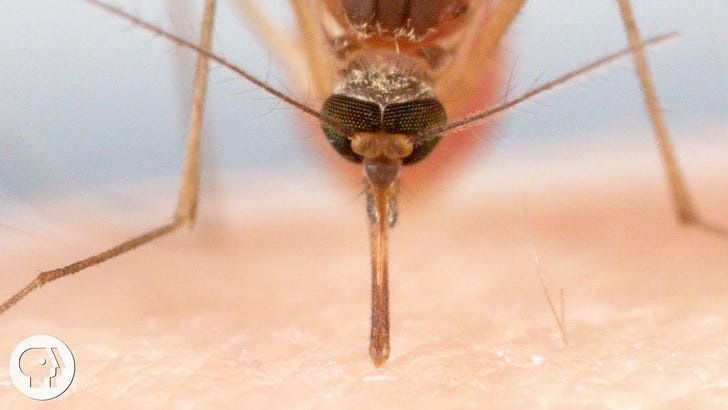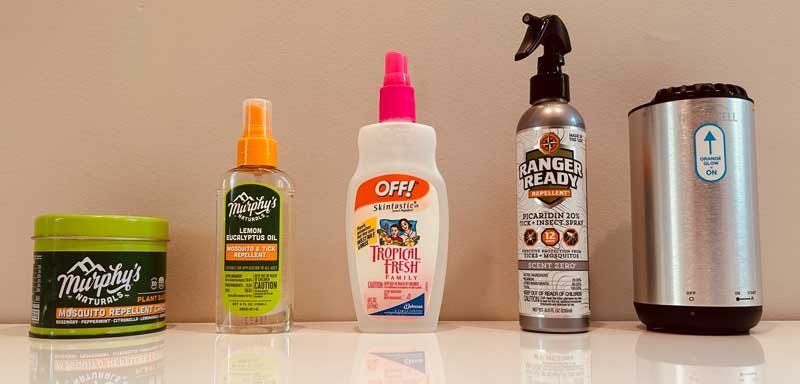Here in Los Angeles, no one in my family can step outside without getting bitten by mosquitoes. This summer has been the worst year for mosquitoes that I can remember. Rising temperatures and more rain than usual have sped up the northward migration of the Asian Tiger Mosquito, which hitched a ride to California in a shipment of ornamental bamboo from South China in 2001. Since then, it’s buzzed its way northward, feasting on the blood of people, horses, and dogs.
Unlike the mosquitoes I recall from my childhood in Colorado, which seemed to limit their feeding times to the early evening, the Asian Tiger mosquito is a relentless predator, active 24 hours a day. It has a peculiar preference for ankles. Stepping out the door without smearing my ankles in repellent guarantees a bite if I'm out for more than a couple of minutes. My wife, Carla, says the outside world feels closed off to her because of these tiny vampires lying in wait on the other side of the door.
According to UC Riverside’s Center for Invasive Species Research, the Asian Tiger Mosquito is an extremely efficient carrier of various mosquito-borne pathogens that cause debilitating diseases. It infects people and animals with potentially fatal ailments such as encephalitis, Dengue fever, Yellow fever, and West Nile virus.
After weeks of being locked in, it was time to fight back. I started by watching videos about these pests. The best one was on PBS’s "Deep Look" YouTube channel (embedded below). The video began by sharing the fact that mosquitoes are the deadliest animal in the world, causing hundreds of thousands of deaths annually due to the diseases it transmits. "No other bite kills more humans, or makes more of us sick," the narrator said. The video showcased numerous vivid close-up images of mosquitoes greedily extracting blood from humans.
As it turns out, mosquitoes possess a complicated proboscis — a marvel of miniaturized design. Its proboscis is a "protective sheath" housing six different needle-like appendages. Two of them, equipped with razor-like teeth, saw into the skin. Another pair holds the incision apart, enabling the mosquito to probe for a blood vessel near the skin's surface. Another needle, functioning as a sensor and sucker, detects chemicals to guide it towards a blood vessel. The final needle injects chemically active saliva, which anesthetizes the skin and injects a blood thinner, making it easier to extract the blood. If all a mosquito did was stick its pointy snout in my skin, suck a few drops of blood, and go on its merry way, I wouldn’t mind. The problem is its insistence on injecting saliva into victims’ bloodstreams. If a mosquito is infected with a virus, it transmits the disease to a human or animal via the saliva. The saliva is also responsible for triggering the allergic reaction, leading to the familiar itch and bump.
Over the past few months, I’ve embarked on a quest to find the most effective ways to repel these dastardly vermin with their noxious saliva. Here are my findings:
Citronella Candles
My first attempt was using citronella candles, which are often touted as a great solution for patio dining. The brand I tried, Murphy's Naturals, combines citronella with rosemary, peppermint, lemongrass, and cedarwood. While the pleasant aroma and ambiance of a candle-lit meal were undeniable, I didn't find these candles effective at repelling mosquitoes. Despite having two or three lit on our table, mosquitoes persistently buzzed around and bit us.
Research suggests that citronella, which is an oil extracted from lemongrass, can repel mosquitoes, but it's highly volatile, requiring frequent reapplication when used on skin. I suspect that a candle simply doesn't produce enough citronella vapor to be effective.
DEET
DEET, a staple in mosquito repellents for over 60 years, was very effective at keeping mosquitoes from biting. It works by disrupting mosquitoes’ ability to detect CO2 and lactic acid, essentially acting as an invisibility cloak for the wearer. Additionally, mosquitoes hate its scent. I used a brand of DEET repellent called “OFF! Family Care Insect Repellent Tropical Fresh,” which didn’t smell good but wasn’t too off-putting. However, my wife Carla developed weird reactions to DEET, causing her surroundings to shimmer and undulate strangely. I also read that there have been rare cases of psychotic reactions attributed to excessive DEET use, so I searched for less psychedelic repellents.




